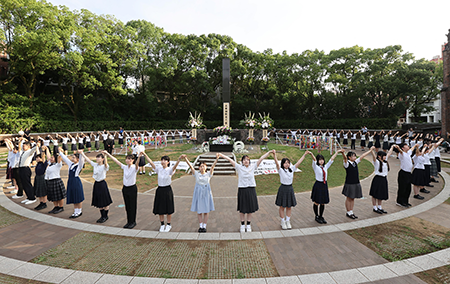"I greatly appreciate your very swift response, and your organization's work in general. It's a terrific source of authoritative information."
Gaza Conflict Casts Shadow on Nagasaki Memorial
September 2024
By Shizuka Kuramitsu
The conflict in Gaza cast a shadow on the recent memorial ceremony recognizing the 79th anniversary of the atomic bombings of Hiroshima and Nagasaki. Representatives of Canada, France, Italy, Germany, the United Kingdom, the United States, and the European Union skipped the ceremony in Nagasaki on Aug. 9 after Israel was disinvited.

The annual ceremony is designed to honor the victims of the U.S. atomic bombing on August 9, 1945; renew a commitment to nuclear disarmament; and honor a long-standing vow never to let such a tragedy happen again. It is estimated that, by the end of 1945, 75,000 people died from the bombing on Nagasaki. The bombing of Hiroshima three days earlier killed an estimated 140,000 people.
The ceremonies are hosted by the cities of Hiroshima and Nagasaki, and their respective mayors have authority to decide who should receive invitations. Since 2022, Belarus and Russia have been the only countries to be disinvited from both ceremonies. This year, Hiroshima Mayor Kazumi Matsui invited Israel, and Nagasaki Mayor Shiro Suzuki did not.
On Aug. 6, after attending the Hiroshima memorial ceremony, Julia Longbottom, the UK ambassador to Japan, told journalists she would not attend the Nagasaki ceremony because disinviting Israel “created an unfortunate and misleading equivalency with Russia and Belarus,” the only other countries not invited to this year’s ceremony, according to multiple Japanese media sources.
On the following day, U.S. Ambassador Rahm Emanuel announced his absence from the Nagasaki ceremony, saying “the mayor of Nagasaki politicized the event by snubbing Israel.” White House spokesperson Karine Jean-Pierre declined to comment on Emanuel’s decision, but State Department spokesperson Matthew Miller said on Aug. 8 that “[n]o country should be singled out, not to be invited for a celebration.”
That same day, Nagasaki’s mayor told a press conference that “the decision to disinvite Israel was not for a political reason.” He confirmed that he received a joint letter from Group of Seven (G7) and EU ambassadors on July 25, stating that “it would be difficult for us to have high-level participation” in the ceremony if Israel were excluded.
Suzuki told reporters on Aug. 8 that it was regrettable that the ambassadors could not understand that “the reason why we did not invite Israel was solely because we wanted to conduct the ceremony smoothly in a peaceful, solemn atmosphere.” After Hiroshima invited Israel to its ceremony this year, its decision was met with public criticism and protests, resulting in more security installations.
Yoshimasa Hayashi, Japan’s chief cabinet secretary, declined to comment on the controversy at an Aug. 8 press conference, saying that Nagasaki hosted the ceremony, not the Japanese national government. Meanwhile, Asahi newspaper reported on Aug. 9 that the Japanese government privately warned Nagasaki city officials that uninviting Israel “could develop to a diplomatic issue.”
Tamashii Honda, a president of Nagasaki A-Bomb Bereaved Families Association, told Yomiuri News on Aug. 8 that he “wanted the [G7] ambassadors to visit the A-bombed city and feel Nagasaki’s desire for peace especially because the war is still ongoing.” It is “very regrettable that the ambassadors will not be attending,” Honda said.
Billionaire businessman Elon Musk fueled more controversy on Aug. 13 when he described Hiroshima and Nagasaki as “bombed but now…full cities again” during a live streaming interview with former U.S. President Donald Trump on X. “It is not as scary as people think, basically,” Musk said of nuclear war. (See ACT, June 2024.)
